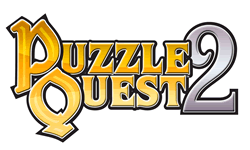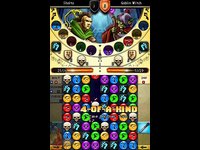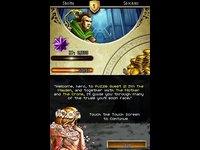|
|

|
PLATFORM
|
DS
|
BATTLE SYSTEM
|

|
INTERACTION
|

|
ORIGINALITY
|

|
STORY
|

|
MUSIC & SOUND
|

|
VISUALS
|

|
CHALLENGE
|
Easy
|
COMPLETION TIME
|
40-60 Hours
|
|
OVERALL

|
+ Combat is fun in small doses
- In large doses, combat is monotonous
- Not much to look at or listen to
- Battles slow down and take way too long
- Every enemy acts the same most of the time
|
Click here for scoring definitions
|
|
|
Solitaire is fun to play occasionally, and it can even be fun to play several games in a row. Playing dozens of solitaire matches in a steady stream erodes all the possible fun and turns the game into a blur of indistinguishable matches, even though the cards are in a different position each time, and should therefore make the matches unique. Herein lies Puzzle Quest 2's problem: what is entertaining for brief stretches does not hold up when played under marathon conditions. Played casually, the game seems to be an entertaining romp in the park. If one plays it frequently and at length, as I did, the charm is quickly lost under a canopy of repetitive tedium.
Every battle in Puzzle Quest 2 plays like a match of Puyo Puyo or Bejeweled: sixty-four slots in an eight-by-eight grid are filled with an array of objects. Most of these are one of five colors of gems, and the goal is to match three of a kind in a straight line. Aside from the colored gems, two other objects also appear on the grid: Action icons and skulls. Linking three Action icons accumulates points for use on whatever item is currently equipped, and linking three skulls deals damage directly to the other side. Explosive skulls sometimes drop down, to deal extra damage along with blowing up the gems next to them if matched with other skulls, along with multipliers that will increase the take received from matched gems. A very important part of combat to notice is that matching four icons instead of three nets an extra turn for whoever accomplished it, something the computer is frequently very good at doing.
Increasing the take from gems is important when the options not directly available on the grid are considered. A character can have up to five abilities for use at any time, provided the number of gems required has been obtained. Abilities and spells have a variety of effects, from planting skulls in the middle of the grid, to stunning the opponent, to blowing up every colored gem and dealing damage thereby. Early in the game, when neither side has very many Life Points, dealing a knockout blow won't take too long. As the player levels, enemies level too, and the constantly increasing life levels make battles take much longer to conclude. Also drawing battles out is the random incidence of spells being prevented, which means whichever side tried the magic strike has just wasted a turn.
 The face on the right side will change, but get used to that bottom screen: you're gonna see a LOT of it.
The face on the right side will change, but get used to that bottom screen: you're gonna see a LOT of it.
|
|
Aside from spells and skulls, weapons are available to deal damage, and equipment to decrease it. Weapons use the Action points that otherwise serve no purpose, and cannot be prevented like magic, though they can be guarded against. Equipment generally serves the purpose of increasing a combatant's defense, and higher defense does not work the way it does in most games; it simply increases the incidence of times when the enemy's attack damage will be cut in half. The game has the gall to slow down for a moment every time someone's defense kicks in, making fights with heavily armored combatants take even longer than usual.
The length of fights matters a great deal when most rooms have nothing in them but one or two enemies that cannot be avoided. Each enemy type does have unique abilities, but ninety percent of every fight plays and looks identical: both sides make blocks on the grid disappear while accumulating resources. This is tolerable if one plays the game in short spurts, with long breaks to make the mechanics feel fresh for a little while. Played at length, like most RPGs, the repetition becomes overwhelming.
The puzzle mechanic is so prevalent in Puzzle Quest 2 that it even appears outside of battle, forcing players to open doors, find and disarm hidden traps, and even obtain the contents of treasure chests by using variants of it. The specifics are somewhat different from regular combat, it is true, but being forced to constantly partake in this tedious task becomes mind-numbing in short order. What would be fine once or twice will become agonizingly monotonous as it is repeated umpteen times throughout the game, particularly since there is no penalty for failure except the wasted time of the player.
Puzzle Quest 2's story is completely generic and unmemorable, though these qualities are not overriding because of how terse the text is. Monsters are coming out of a dungeon near a town called Verloren, and it is the player's job to smash everything that menaces the townsfolk; with junctures for various types of monsters, that is the entire plot. The paucity of text in the game makes it acceptable, though it is odd how many typos crept into the very small amount of writing.
 Thanks a lot: you wouldn't happen to have a fast-forward option? Nah, didn't think so.
Thanks a lot: you wouldn't happen to have a fast-forward option? Nah, didn't think so.
|
|
Audio and visuals are not Puzzle Quest 2's strength. Every battle looks identical, save for the portrait of the opponent on the top screen (which plays no role in combat except looking nifty). The environments of the game also look similar to each other. As for the audio: monotonous is too soft a word for its pathetically puny variety. The number of music compositions can be counted on one hand, and while they are not abhorrent, they feel like incidental music from a movie soundtrack that was not meant to be heard on its own.
One thing Puzzle Quest 2 does not skimp on is content, because there are plenty of easily accessible side quests to investigate. The four character types that the game can be played as also vary dramatically, turning the initial encounters of a new game into something different. Sadly, the enemy will almost always succumb to the same strategy, making it unnecessary to vary tactics once a formula that works is found. Exacerbating the sameness will be the egregious amount of time to complete the game, which is hard to measure without an in-game clock but will require over forty hours unless one deliberately avoids everything not mandatory. Defeat still awards some experience, but this makes it even easier to reach level fifty, the maximum in the game, at which point all additional experience is worthless.
Most RPGs are meant to be played steadily, but Puzzle Quest 2 is most assuredly not the sort of game to be played at length. In short bursts separated from each other by lengthy periods spent doing something else, the mechanics remain entertaining. If someone tries to play Puzzle Quest 2 in a marathon session, the sense of déjà vu will increase, with each room and fight blending into an indistinguishable lump of tedium. Since the game has nothing but combat to offer, this is not a recipe for happy gaming.
Review Archives
|









